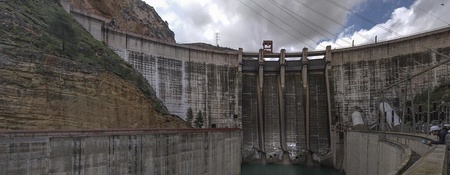David Haro was awarded a NERC Global Seedcorn Partnership Fund to initiate collaborative research with colleagues from Cranfield University (UK), International Institute for Applied Systems Analysis (Austria), Universitat Politècnica de València (Spain), and Estación Experimental de Aula Dei (Spain). During the next two years, the team will develop a ‘proof-of-concept’ that explores the integration of catchment water management models (CWMMs) and large-scale hydrological models (LHMs).
Over recent decades major advances have been made in global hydrological modelling underpinned by progress in high-resolution data availability, as well as in computational and data storage capabilities. These advances have provided hydrologists with opportunities to develop high-resolution LHMs designed to represent and study the global hydrological cycle. However, LHMs have recently been used in several regional applications, an adaptation enabled by their increasing spatial resolution which makes it possible to zoom-in on specific regions, essentially removing the barriers between global and regional models.
Although the influence of water management on the hydrological cycle may be disguised at the global scale, it has been reported as an important modifier of regional water supply and hydrological variability. Notwithstanding their growing sophistication, the current generation of LHMs still fall short in their ability to represent human impacts on freshwater systems, e.g. dynamic trade-offs among irrigation water supply, flooding control and hydropower production, and water competition between upstream and downstream users. These processes are increasingly important for regional hydrological model simulation and their neglect hinders the ability of LHMs to provide reliable insights at any scale other than the global, leaving the task of incorporating human water management activities within these models as one of the grand challenges for the hydrologic research community.
CWMMs adopt a holistic systems approach to comprehensively address water availability, use, infrastructure, and policy aspects within multi-sectoral water allocation, and are applied for the efficient management of water resources by informing decision making and stakeholder collaboration. The coupling of these models with LHMs can enhance their representation of human interventions in the natural water cycle (e.g., management of reservoirs, intra- and inter-basin water transfers) and improve the accuracy of water demand estimations such as irrigation requirements by including irrigation schemes. The inclusion of this local knowledge into the modelling process can also enable more active engagement with stakeholders and associated capacity building.
This project will foster the evolution of LHMs to better represent the human impacts on the water cycle at regional and local scales by incorporating the capabilities of CWMMs into LHMs.


